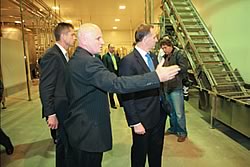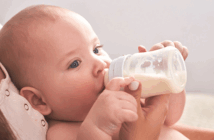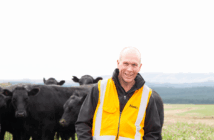
The food and beverage sectors begin an earnest attack on a target of $160 billion worth of processed food exports by 2025.
Plans to dramatically increase the level of New Zealand’s food and beverage exports – which already account for more than half the country’s trade earnings – are being made by industry experts with multi-million support from the government.
The goal is a jump of 270 percent to an annual total of $159 billion by 2025.
A landmark step towards achieving that target came this month when the long-awaited FoodBowl, run by New Zealand Food Innovation (Auckland) Ltd (NZFIA), became operational at its purpose-built facility near Auckland International Airport.
The Foodbowl is a key feature of NZFIN, a nation-wide open-access network of innovation centres, designed to provide comprehensive food science and technology resources.
This pioneering facility is the second recent major advance benefitting the food industry.
The other is New Zealand’s first state-of-the-art UHT aseptic PET bottling plant at Whakatu Industrial Park near Hastings, which was opened by Prime Minister John Key in September.
In addition to ensuring that bottled milk and juice products are shelf stable without refrigeration for up to 12 months, this plant will be the first in the world to produce UHT liquid infant formula in a patented teat cap PET bottle.
The value of the FoodBowl to the New Zealand economy was stressed by board chairman Tony Nowell in an earlier exclusive interview with FOODtechnology.
He explained that the centre will provide experts to advise on a great spectrum of matters – including packaging, marketing and finance – in addition to those concerning production techniques and advances.
“Of the 1,840 food manufacturing companies in New Zealand, 55 percent employ more than five but less than 100 people,” he said.
“As a result, these companies often don’t have the infrastructure or expertise to accelerate product development, develop foreign markets and maintain an in-market presence.
“At the moment, if a New Zealand manufacturer wants to try a new idea, ordinary production must be halted – which is costly – or capacity hired in pilot facilities overseas.”
Now that can be done at far less expense at the FoodBowl which was built and equipped at a cost of $16 million – with the government contributing $9.4 million and Auckland City Council providing $2.5 million.
“So the resources of the FoodBowl will overcome a critical deficiency in New Zealand’s new product development process – the ability to upscale sophisticated new products from laboratory to commercial production – and will fill the gap between the idea stage and getting successful production on market shelves,” says Mr Nowell.
“It will also help manage the risks of innovation by minimising capital and expertise investment until products and markets are proven.”
Eventually there will be four innovation centres in the nation-wide network.
Those at Palmerston North and Canterbury were the first to start operating and the Waikato one is scheduled to open mid-2012.
Each will have a distinctive focus.
Palmerston North draws on the expertise of 600 scientists and technologists including specialists at Massey University, Riddet Institute, AgResearch, Plant and Food Research and Fonterra Innovation.
Canterbury concentrates on the particular needs of the South Island and helps with overseas marketing as well as production.
Waikato will specialise in dairy. This is immensely important as New Zealand’s annual dairy exports now top $12 billion – and there are opportunities for major expansion.
This importance is reflected in the fact that Waiktao Innovation Park’s parent company, Innovation Waikato, has formed a subsidiary – NZ Food Innovation Waikato.
This subsidiary will own and operate the NZ dairy industry’s first independent product-development spray dryer. It will have the capacity to deal with half a tonne an hour and will be suitable for manufacturing fruit and vegetable powders as well as whole milk powders.
Former government food safety auditor Neil McGarva is the managing director of Etika Dairies NZ Ltd which owns the new UHT aseptic PET bottling line opened by John Key.
He says its cold-filling technology allows for the use of lightweight bottles which cuts energy consumption as well as reducing the amount of material used and, more importantly, the method results in fresher food without the need for preservatives.
Mr McGarva adds: “We are delighted that even before we opened most of our initial capacity had been pre-allocated and plans are already afoot for a second line which will see capacity increased from 6,000 to 30,00 bottles per hour.”





























































































